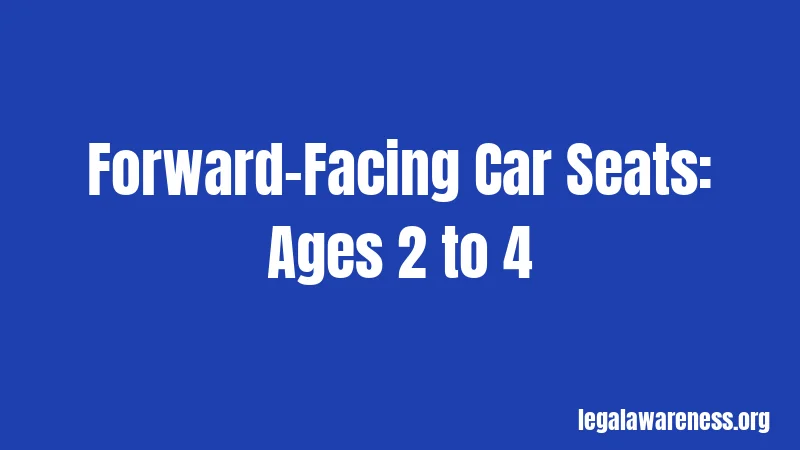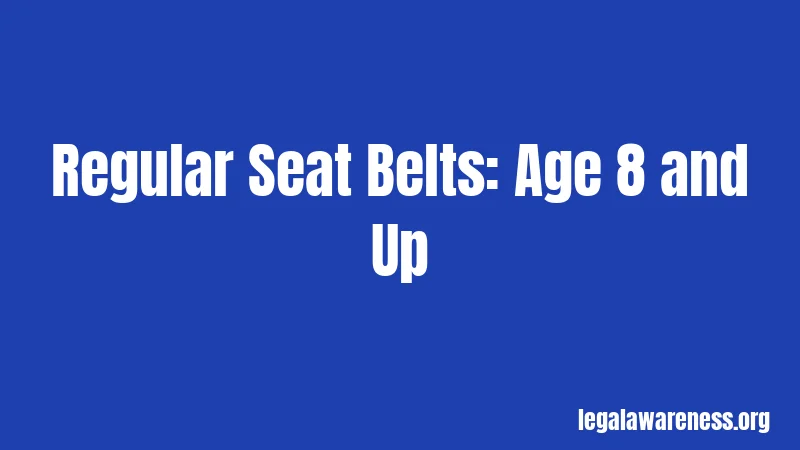Car Seat Laws in New Jersey (2026): Rules Parents Must Follow
Most parents think they know the car seat rules. Then they get pulled over. Turns out, New Jersey’s laws are stricter than many people realize, and the requirements changed back in 2015. Let’s break down exactly what you need to know to keep your kids safe and avoid those fines.
What Are New Jersey’s Car Seat Laws?

New Jersey has specific rules about child passenger safety. These laws are based on your child’s age, weight, and height. Not just one factor—all three matter.
The state updated these laws in 2015 under Title 39:3-76.2a. The goal? Keep kids safer in crashes. Motor vehicle accidents are the number one cause of death for children over six months old in the United States. Pretty serious stuff, right?
Here’s the deal. Every parent or driver transporting a child in New Jersey must follow these rules. No exceptions for taxis, Ubers, grandma’s car, or anyone else. If there’s a child in the car, the law applies.
Rear-Facing Car Seats: Birth to Age 2
Your baby needs to face the back of the car. This is the law for all children under two years old who weigh less than 30 pounds.
The seat must have a five-point harness. That’s the one with straps over both shoulders, both sides of the hips, and between the legs. You’ve probably seen these—they look like a star pattern.
Honestly, this is probably the most important rule. Rear-facing seats protect your baby’s head, neck, and spine way better than forward-facing ones. In a crash, the seat cradles your child instead of throwing them forward.
Keep your child rear-facing as long as possible. Many car seats today can handle kids up to 40 or even 50 pounds while still facing backward. Check your seat’s manual for the weight and height limits.
Forward-Facing Car Seats: Ages 2 to 4

Once your child turns two and weighs more than 30 pounds, they can face forward. But hold on—there are still rules.
Children under four years old who weigh less than 40 pounds must stay in a car seat with a five-point harness. The seat can face forward now, but it still needs that five-point harness system.
Here’s where it gets interesting. You can actually keep your child rear-facing past age two if they haven’t hit the weight or height limit of their rear-facing seat. Many experts recommend this. Safer is better, right?
The key is following both the law and your car seat manufacturer’s instructions. If your seat says your three-year-old can still ride rear-facing, that’s totally fine. The law allows it.
Booster Seats: Ages 4 to 8
Your child graduates to a booster seat once they outgrow their forward-facing car seat with the harness. This typically happens around age four or when they hit 40 pounds.
New Jersey law says kids under eight years old and shorter than 57 inches must use a booster seat. That’s 4 feet 9 inches if you’re measuring. Most kids don’t reach this height until they’re around 10 or 11 years old, honestly.
Booster seats lift your child up so the regular seat belt fits properly. The lap belt should sit across the upper thighs, not the stomach. The shoulder belt should cross the chest and shoulder, not the neck or face.
Wondering if your child is ready to ditch the booster? Here’s a quick test. Can they sit all the way back against the vehicle seat? Do their knees bend comfortably at the edge? Do their feet touch the floor? If not, they need to stay in the booster.
Regular Seat Belts: Age 8 and Up

Once your child turns eight or reaches 57 inches tall, they can use a regular seat belt. Whichever comes first.
But here’s something important. New Jersey law doesn’t say when kids can move from the back seat to the front seat. The CDC recommends keeping children in the back until age 12. Makes sense—front seat airbags can seriously hurt small kids.
Even after age eight, make sure the seat belt fits correctly. Remember that test I mentioned? Feet flat on the floor, knees bent at the seat edge, lap belt on the thighs, shoulder belt across the chest. If the belt doesn’t fit right, your child should stay in a booster a bit longer.
Where Should the Car Seat Go?
All children under eight and under 57 inches must ride in the back seat. This is the law unless your vehicle doesn’t have a back seat.
Got a pickup truck or sports car with no back seat? Okay, your child can ride up front. But wait—if you’re using a rear-facing seat in the front, you must turn off the passenger airbag. Seriously. Airbags can kill infants and toddlers in rear-facing seats.
The middle of the back seat is actually the safest spot. It’s the farthest from any impact points in a crash. If you’ve got multiple kids, put the youngest one in the middle if possible.
Installing Your Car Seat Correctly
Here’s a stat that might surprise you. Three out of four car seats are installed incorrectly. Yep, 75% of parents think they’ve got it right, but they don’t.
Most cars made after September 2002 have the LATCH system. That stands for Lower Anchors and Tethers for Children. These metal anchors make installation easier than using seat belts.
Check your car seat’s manual. Then check your vehicle’s manual. I know, reading manuals is boring. But doing it wrong could cost your child’s life in a crash. Worth the 15 minutes, right?
Pull hard on the seat after you install it. Can you move it more than an inch in any direction? If so, it’s too loose. Tighten those straps until the seat barely budges.
Free Car Seat Inspections in New Jersey
Not sure if your seat is installed correctly? New Jersey offers free inspections all over the state.
Certified technicians will check your installation. They’ll fix any problems and show you how to do it right. These people know their stuff—they go through serious training.
Here are some places offering free inspections:
Union County holds weekly inspections every Wednesday and Thursday from 7:30 AM to 11 AM at the Garwood First Aid Squad. No appointment needed. Just show up.
Somerset County does inspections the first Saturday of each month from 10 AM to 1:30 PM and the third Wednesday from 3 PM to 6:30 PM. Also no appointment required.
Burlington County Sheriff’s Office offers checks every first and third Wednesday from 10 AM to 2 PM. Call when you arrive at 609-265-3788.
Middlesex County requires an appointment. Call Sergeant Allan McDemid at 732-745-3166. They’re available weekdays from 8 AM to 2 PM.
Many police departments and fire departments also have certified technicians. Call your local station to ask. Most are happy to help.
Penalties for Breaking the Law
Get caught with an improperly restrained child? You’re looking at a fine between $50 and $75.
That might not sound like much. But think about it—if you’re cutting corners on car seat safety, the real cost could be your child’s life. Not worth the risk.
Police can pull you over just for a car seat violation. They don’t need another reason. If they see a child who’s not properly restrained, that’s enough.
Some parents argue they were following the manufacturer’s instructions instead of state law. The law doesn’t care. You have to follow both the law and the manufacturer’s guidelines. And if they conflict, you follow whichever is stricter.
Special Situations and Exceptions
What about Ubers and taxis? Same rules apply. Your child needs the appropriate car seat, even in a rideshare. No exceptions.
Traveling with grandparents? Same rules. Borrowing a friend’s car? Same rules. The law doesn’t care whose car it is.
School buses are different. They’re exempt from the car seat laws. But New Jersey now requires school buses to have three-point seat belts. This law passed after a deadly crash in which a student and teacher died.
What if you’re in a crash? Replace the car seat immediately. Even if it looks fine, the impact might have caused hidden damage. Most insurance companies will pay for a replacement.
Car Seat Expiration Dates
Yes, car seats expire. Most last between six and ten years from the date of manufacture.
Check the label on the back or bottom of your seat. It should show the manufacture date and expiration date. Using an expired seat is dangerous—the plastic degrades over time and won’t protect your child properly.
Got a hand-me-down seat from a friend? Great for saving money. But check the expiration date first. And make sure it’s never been in a crash. Even minor accidents can compromise a seat’s safety.
Register your car seat with the manufacturer. Fill out that card and mail it in or register online. This is how they’ll contact you about recalls. Lots of seats get recalled every year, and you need to know if yours is one of them.
Choosing the Right Car Seat
So many options exist today. All car seats sold in the U.S. must meet federal safety standards. That’s the good news.
The right seat for you depends on your child’s size and your vehicle. Some seats fit better in certain cars. Try it out before you buy if possible.
Read reviews. Talk to other parents. Check consumer reports. But remember—the best car seat is the one that fits your child, fits your car, and that you’ll use correctly every single time.
Three-in-one seats seem convenient. They convert from rear-facing to forward-facing to booster. Some families love them. Others prefer buying separate seats as their child grows. Both approaches work as long as you follow the rules.
Common Mistakes Parents Make
Installing the seat too loosely is mistake number one. Remember, it shouldn’t move more than an inch in any direction.
Turning kids forward-facing too early is another big one. Many parents flip the seat around at age two, even though keeping them rear-facing longer is safer.
Using the wrong harness slot height happens a lot. For rear-facing seats, the straps should be at or below your child’s shoulders. For forward-facing, at or above the shoulders. Check your manual.
Threading the seat belt through the wrong path is surprisingly common. Every seat has a different belt path. Don’t guess—read the instructions.
Leaving the harness too loose is dangerous. You should only be able to fit one finger between the harness and your child’s collarbone. Any looser, and your child could be ejected in a crash.
When to Move Up to the Next Stage
Don’t rush it. Seriously. Each stage exists for a reason, and moving too early puts your child at risk.
Keep your child rear-facing until they hit the height or weight limit of the seat. For most modern seats, that’s around age three or four. Don’t flip them forward just because they turn two.
Stay in the five-point harness until your child outgrows it. Some seats can handle kids up to 65 pounds with the harness. Use it as long as you can.
Stick with the booster until your child is at least eight years old or 57 inches tall. Even then, check if the regular seat belt fits properly. If not, keep them in the booster.
Teaching Older Kids About Seat Belts
Once your child can use a regular seat belt, teach them to buckle up every single time. No exceptions.
Make it a rule that the car doesn’t move until everyone is buckled. Stick to it. Kids learn fast when the rule is consistent.
Explain why it matters. Show them crash test videos appropriate for their age. Help them understand that seat belts save lives.
Set a good example. Always wear your own seat belt. Kids copy what they see way more than what they hear.
Traveling Out of State
Heading to another state? Their laws might be different. New Jersey’s laws are actually stricter than many other states.
If you’re following New Jersey law, you’re probably fine anywhere. But it’s worth checking the rules in the state you’re visiting, just to be safe.
Coming to New Jersey from another state? You must follow New Jersey law while you’re here. Even if your home state’s rules are more relaxed.
Final Thoughts
New Jersey’s car seat laws exist for one reason—to save children’s lives. The rules might seem complicated, but they’re based on solid safety research.
Take the time to install your seat correctly. Get it inspected if you’re not sure. Keep your child in each stage as long as possible. Follow both the law and your seat’s instructions.
Most importantly, use the car seat every single time. Every trip, every time, no exceptions. Consistency is what keeps your child safe.
Still have questions? Contact your local police department. Visit a free inspection station. Or call the New Jersey Division of Highway Traffic Safety. They’re there to help.
Your child’s safety is worth the effort. Trust me on this one.
Frequently Asked Questions
Can my two-year-old face forward if they’re over 30 pounds?
Yes, according to New Jersey law. But many safety experts recommend keeping them rear-facing longer if your seat allows it. Rear-facing is safer for young children, even after age two.
Do I need a car seat in an Uber or taxi?
Absolutely. New Jersey law has no exceptions for taxis or rideshare vehicles. If you’re traveling with a child, you need the appropriate car seat for their age and size.
What if my car doesn’t have a back seat?
Your child can ride in the front seat using the appropriate car seat. But if you’re using a rear-facing seat, you must turn off the passenger airbag. This is critical for your child’s safety.
How do I know if my car seat is expired?
Check the label on the back or bottom of the seat. It should show the manufacture date and expiration date. Most seats expire six to ten years after manufacture.
Can my seven-year-old sit without a booster if the seat belt fits?
Not unless they’re at least 57 inches tall. New Jersey law requires boosters for all children under eight and under 57 inches, regardless of how the seat belt fits.
References
- New Jersey Statutes Title 39:3-76.2a – Child Passenger Restraint Systems
- New Jersey Division of Highway Traffic Safety – Child Passenger Safety
- National Highway Traffic Safety Administration – Car Seat Safety
- Centers for Disease Control and Prevention – Child Passenger Safety
- American Academy of Pediatrics – Car Seat Recommendations
